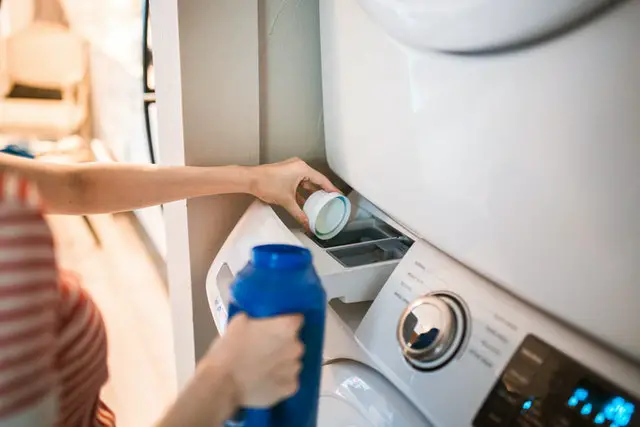Run out of laundry detergent? You might be tempted to use dish soap as a replacement, since both dish soap and laundry detergent contain cleaning agents that perform nearly the same function after all — to get rid of grease and soiling.
But holup a bit. Get to understand the facts and the risks involved with using dish soap to perform laundry.
That way, you are better prepared for whatever issue that might crop up in the course of your laundry experiment.
So, can you actually use dish soap to clean clothes?
You can use dish soaps to clean clothes but only using hand technique and not the washing machine. Avoid cleaning clothes with dish soap in the washer because dish soaps are made to foam and produce suds, more so than laundry detergents or even dishwasher detergents. Because of that, they can overwhelm the washer and make cleaning very inefficient. They can also make draining a bit more difficult than normal which can be extremely frustrating.
Read more: Can You Dry White Clothes With Colors?
So unless, you really need to, like in times of desperation, avoid using dish soap to do laundry.
Below we discuss more on using dish soaps to wash clothes.
You can, but not always
Dish soaps can be your number one go to when you run out of laundry detergents.
That’s not a problem at all, and it’ll wash your clothes to a pleasantly satisfactory degree, especially clothing like lingerie, linine, hosiery and other delicate fabrics that require mild detergents to be used on them.
The only critical thing to note about using dish soaps in the dishwasher is to avoid putting them in a washing machine. You’ll definitely run into problems when you do so.
Read more: Is Polyester A Good Material?
First, your washer will be overwhelmed with the amount of suds that would form and that can lead to overflow in front load washers.
Because dish soaps are formulated to create so many suds that give the feeling of “proper cleaning” to people who use them, using them in the washer where agitation is even more pronounced will result in a sudsy disaster.
And in case you didn’t know, where there’s too much suds, cleaning efficiency is reduced, and draining of suds becomes next to impossible, except when you remove them from the machine yourself using a container which can be arduous.
Because of these reasons, the best way to use dish soap for laundry is when you’re hand washing. Suds will definitely form, but there’s no risk of drain blockage from soap scum left by suds.
The best part is that you can easily manage the suds that develop as you wash the clothes, which when left, like in the washer, can end up impeding your washing progress.
Read More: Can You Wash Back Pack With Clothes?
With all that said, you should bear in mind that using dish soap to wash clothes consistently will definitely result in washing problems for your fabric.
There’s a reason dish soaps are called dish soaps. They’re meant to clean dishes the best way they can.
Don’t expect perfect cleaning when using dish soaps to launder clothes. As a matter of fact, expect to run into recurrent stains, soil build up over time and a generally smelly clothes with continued usage.
That’s because dish soaps aren’t quite formulated like laundry soaps, and they may not contain some key constituents which may benefit your clothes during laundry.
Read More: Can You Put Dish Soap In Dishwasher?
What about automatic dishwasher detergents(ADD)? Can I use them to launder?
Avoid using automatic dishwasher detergents to wash clothes. The reason is similar to what is outlined for using dish soap in laundry.
ADD’s are formulated with dishes in mind, and not fabrics, so they may contain constituents in them that aren’t compatible with fabrics, or can even end up destroying them i.e cause fading or bleaching or even pose threat to our health by causing skin irritation when they persist on the fabric even after rinsing.
Even if they don’t end up destroying clothes, they may not clean them efficiently by virtue of the fact that they’re not meant to clean fabrics in the first place.
So when it comes to laundry, always make sure to use laundry detergents, and even that, use products that are specifically meant for your particular type of cloth.
How about shampoo and body wash?
Like dish soap, shampoo and body wash produce suds, and these can impede the working efficiency of your washer. There’s a huge likelihood they will not clean your clothes the way you like them also.
So stir clean of these when doing the laundry in the machine.
When washing by hand however, you can use mild and gentle shampoos like baby shampoos to wash clothes. But make sure you’re using no more than one teaspoon, as going higher will produce too many suds.
Emergency Laundry Detergents
So dish soaps are in the grey area: they are fine to use as laundry detergents but only when you’re washing by hand and in times of emergency. So what other alternatives are a bit more flexible?
Here it is:
Fall back to the last bit of detergents in the bottle. Add little water to the finished bottle of detergent to create a solution and use that to wash your clothes.
As a boost, add one cup of baking soda to the mix, you’ll be shocked to find out how clean your clothes turn out in the washer.
When you have stubborn spots, of course ensure to pretreat them before using this technique to achieve a manageable cleaning.
Additionally, when there’s absolutely nothing left in the detergent container, you can use only water and baking soda, but where you clean the fabric has to be the washer so that the agitation from it add to the over washing effect.
How about the other way round? Can you use laundry detergent to wash dishes?
You could when the detergent is mild and doesn’t contain special additives and products like bleach and softeners, and most importantly, when you rinse the dishes very well to remove any lingering residue.
That’s the main point of concern when it comes to washing dishes with laundry detergent.
Any remnant of these powerful chemicals can end up in your body and eventually pile up to make you sick, and unless you make it a point of duty to always rinse plates until a slight friction over them returns a squeaky sound, consuming laundry chemicals will definitely be your fate!
If you want to go the safest route, use baking soda and water. Work the two into a paste and apply it directly on the soiled spot.
Scrub in a circular motion and rinse properly, and there you have it, a perfectly clean pot ready for use later!
Final Thoughts
Dish soaps are quite mild, and they may be used to clean delicate fabrics that call for mild laundry detergents when you don’t have them. But never substitute laundry detergent and dish soaps for one another, as both serve separate functions and using one in applications that call for the other can definietly impede efficiency.


